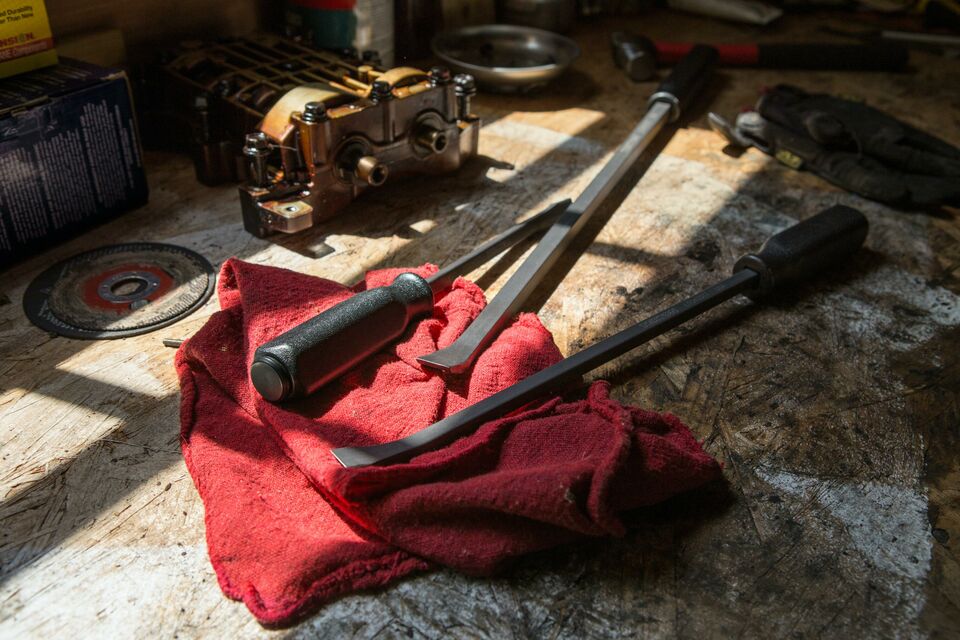A great mechanic or a skilled carpenter is a gift to us all. Two things, besides innate talent, make either as good as they are: experience and patience. I wonder which came first? The patience to learn, or the experience to demonstrate the need for patience. I guess like the chicken and the egg, it’s a case of both and we’ll never really know the answer. Great carpenters and great mechanics have had to learn the hard way, through experience. They’ve had to conquer the basic human element, impatience, that prevents most of us from ever becoming great mechanics or great carpenters. Our desire to get to the end result in a hurry is not the key to success. That’s what holds most of us back. That is what impresses me so much about craftsmen who are good with their heads and their hands. I take every chance I can to study how they approach their work in a steady measured way. They know the shortcut will likely be the long way around. They have the discipline to follow a pattern and a procedure that narrows in on the cause and then zero in on the solution. A great mechanic stays on the path, always starting at the beginning and not skipping steps along the way. The great mechanic is not just throwing parts at the problem. They are following a painstaking path of elimination in which even the most unlikely hidden issue may be the culprit. Where you and I might be ordering new parts, the great mechanic finds the chafe in the middle of the wiring harness by process of elimination. The great mechanic is like Columbo, in his or her dogged determination to uncover each fact in the case. Even though the process may look slow, it is deliberate and leaves no stone unturned, no surprises for later. The obvious is something anyone can find. The hidden subtle, weak link is the potential time bomb that will tick until you can likely least afford to have it explode, and then it will. A great mechanic pulls in the related elements and looks at the whole picture, invents the tool that fits in the spot that would deny access to any of the rest of us, and also stays open to continually build on experience, so that each job becomes the foundation for the next.
Great carpenters are the same. I love to watch and learn. Four years ago, we were raising a 200 year old Maine barn to put it on a new poured concrete foundation. For two centuries, it had been sitting on a stacked stone foundation with no footing, no frost protection, or so I thought. The original carpenters in 1820 were experienced enough to have studied the soil, beach like sand, at the edge of a river whose course must have run through the barn’s area thousands of years ago. Their experience told them that this was a good spot and this sand would drain well, which it has. The cellar area of the barn had a number of support posts, sizeable logs standing vertically like colonial ally columns to support the main barn floor system. The building mover, an experienced Mainer, who seemed loaded with conventional wisdom, told me to check the bottoms of these columns when we removed them for the first time in 2 centuries. They were in perfect shape, with no rot at all in them. He asked me if I knew why, as they had been simply sitting on a large rock base for all this time. “No clue” I replied. He pointed to the fact that each base rock was actually sitting on a second base rock and that with the log sitting on both of them stacked one atop the other, it kept the bottom of the log far clear of any water but the second rock also acted as enough of a thermal break to keep frost from working into the end of the log and starting the rot process. These logs looked in incredibly good shape. How long would it take any of us to figure this out from scratch? Humbled, I realized I would never have lived long enough to discover this on my own.
The best part of a gifted mechanic or carpenter is their ability to share their knowledge, as the building mover did with me. Two hundred years ago, we had apprenticeships. Today we have YouTube. Think of the power of combining both! Instead of trying to hire away the skilled carpenter from your competitor, think about how we train up someone from within. How about more coaching and less poaching? Building talent will give you what you want. Buying it, you get what you get. Talent takes time and investment, we shouldn’t be afraid to invest and develop. We should all be concerned with the future...we’re destined to spend the rest of our lives there!
